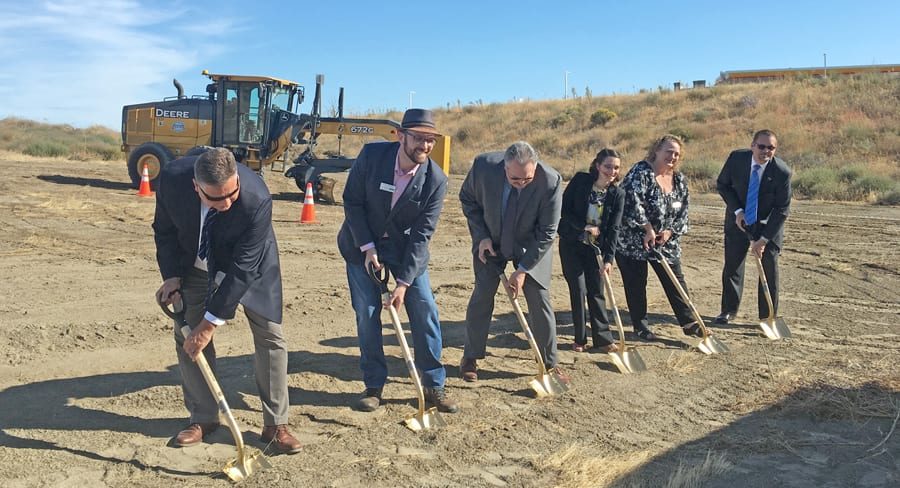
Home » Pasco breaks ground on new multimillion dollar pump station
Pasco breaks ground on new multimillion dollar pump station

October 12, 2018
Just outside the Pasco city limits, city leaders and engineers broke ground on a new pump station that will help divert wastewater from food processors into the Pasco Process Water Reuse Facility.
The Sept. 26 groundbreaking marks the beginning of a project intended to keep more process wastewater out of the city’s municipal Wastewater Treatment Plant than the program already does. The project includes construction of the Columbia East Pump Station as well as two five mile-long, 16-inch force main pipes that will run from the pump station up north to the reuse facility.
Construction begins this fall on the pump station, after the Washington state Legislature provided the city with
$2.6 million for the project. The pump station is at the intersection of the Pasco-Kahlotus Highway and Commercial Avenue.
City Manager Dave Zabell said city engineers worked hard in recent months to bring the pump station design plans to fruition. Clearwater Construction of Spokane is the general contractor on the project. The city will request bids for the construction proposal on the dual force main pipes soon.
The pump station is the second phase of a public-private partnership the city of Pasco gambled on back in the 1990s. The city owns 15 crop circles northeast of city limits, which are irrigated using the reuse facility’s water. The program helps attract food processors to the area and in turn keeps wastewater out of the city’s municipal water system. The reuse facility currently receives wastewater from five food processors, and the new pump station and water line will provide a more reliable way to process the water for two food processors to the program: Simplot RDO and Freeze Pack. It will also add another processor to the program: Grimmway Farms.
Food processing plants account for a significant amount of wastewater discharge. Zabell said Grimmway currently discharges about 1.25 million gallons of wastewater each day that currently goes to the municipal wastewater treatment plant. This is a costly way to treat this kind of water, and diverting Grimmway’s flows to the reuse facility will help alleviate the city’s wastewater system, Zabell said.
“Our sewer capacity right now is probably - and during our peak in the summer when Grimmway is running - exceeds the 85 percent threshold that the Department of Ecology likes to keep wastewater treatment plants at,” Zabell told the Pasco City Council on Sept. 24.
By lowering the city’s current sewer wastewater capacity with Grimmway moving its wastewater flows to the reuse facility, Zabell told the city council that the city’s municipal wastewater capacity would be down in the 70th percentile instead, alleviating pressure to make other capacity improvements immediately.
“We’ll have a little bit more time, which could impact how we bond and how we phase those projects, so probably over 10 or 15 years the same work is going to get done, instead of five or nine years,” Zabell said.
This means Pasco taxpayers will see less of a steep increase in taxes for the water and sewer improvements with the pump station and force main pipe than if the city did not build it.
“We’re talking about some pretty massive numbers when we’re talking about how much wastewater is diverted from our (municipal wastewater) sewer,” said Mayor Pro-Tem Craig Maloney.
Simplot RDO discharges about 1 million gallons of wastewater a day into the reuse facility, and Freeze Pack discharges over 30,000 gallons a day, Zabell said.
The city’s capital improvement plan calls for additional improvements, but the pump station and force mains alone are estimated to cost $12.2 million at completion. The reuse facility itself needs improvements that will cost more than $11 million.
The city of Pasco is still working to secure the funding necessary for the completion of the pump station and the force main pipes. The city has applied for a U.S. Economic Development Administration grant for the project which is under review. The city already received two Franklin County grants for the project. The food processors that will use this facility will pick up the rest of the cost, estimated at $5.6 million, which will be bonded by the city.
Pasco Economic Development Director Rick White said this year that industrial growth in the city could jump with improvements to the reuse facility. The city uses the treated water from reuse facility to irrigate 15 crop circles that the city leases to local farmers. The program is currently at capacity, and if Pasco could expand its reach, both the farming and food processing industries would likely take notice.
The new pump station and force main pipe will enable Pasco to service more food processors looking to locate to the area. Construction on the station will begin this fall, and construction of the force main pipe is set to begin in spring 2019.
Real Estate & Construction Local News
KEYWORDS october 2018




